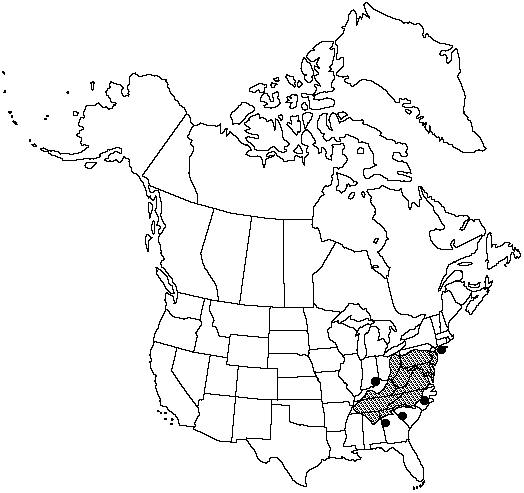Difference between revisions of "Pinus virginiana"
Gard. Dict., ed. 8 Pinus no. 9. 1768.
FNA>Volume Importer |
FNA>Volume Importer |
||
| Line 23: | Line 23: | ||
|elevation=0–900m | |elevation=0–900m | ||
|distribution=Ala.;Del.;Ga.;Ind.;Ky.;Md.;Miss.;N.J.;N.Y.;N.C.;Ohio;Pa.;S.C.;Tenn.;Va.;W.Va. | |distribution=Ala.;Del.;Ga.;Ind.;Ky.;Md.;Miss.;N.J.;N.Y.;N.C.;Ohio;Pa.;S.C.;Tenn.;Va.;W.Va. | ||
| − | |discussion=<p>Pinus virginiana is weedy and fire successional and often forms large stands. It is mostly too small and too profusely branched to be valued except as pulpwood.</p> | + | |discussion=<p><i>Pinus virginiana</i> is weedy and fire successional and often forms large stands. It is mostly too small and too profusely branched to be valued except as pulpwood.</p> |
|tables= | |tables= | ||
|references= | |references= | ||
| Line 46: | Line 46: | ||
|publication year=1768 | |publication year=1768 | ||
|special status= | |special status= | ||
| − | |source xml=https://jpend@bitbucket.org/aafc-mbb/fna-data-curation.git/src/ | + | |source xml=https://jpend@bitbucket.org/aafc-mbb/fna-data-curation.git/src/8f726806613d60c220dc4493de13607dd3150896/coarse_grained_fna_xml/V2/V2_802.xml |
|genus=Pinus | |genus=Pinus | ||
|species=Pinus virginiana | |species=Pinus virginiana | ||
Revision as of 15:50, 18 September 2019
Trees to 18m; trunk to 0.5m diam., straight or contorted to erect or leaning; crown irregularly rounded or flattened. Bark gray-brown with irregular, scaly-plated ridges, on upper sections of trunk reddish, scaly. Branches spreading-ascending to spreading-descending; twigs slender, red- or purple-tinged, often glaucous, aging red-brown to gray, rough. Buds ovoid to cylindric, red-brown, 0.6–1cm, resinous or not resinous; scale margins white-fringed. Leaves 2 per fascicle, spreading or ascending, persisting 3–4 years, 2–8cm × 1–1.5mm, strongly twisted, deep to pale yellow-green, all surfaces with inconspicuous stomatal lines, margins serrulate, apex narrowly acute; sheath 0.4–1cm, base persistent. Pollen cones ellipsoid-cylindric, 10–20mm, red-brown or yellow. Seed cones maturing in 2 years, shedding seeds soon thereafter, persisting to 5 years, symmetric, lance-ovoid or lanceoloid before opening, ovoid when open, 3–7(–8)cm, dull red-brown, nearly sessile or on stalks to 1cm, scales rigid, with strong purple-red or purple-brown border on adaxial surface distally; apophyses slightly thickened, slightly elongate; umbo central, low-pyramidal, with slender, stiff prickle. Seeds compressed-obovoid, oblique apically; body 4–7mm, pale brown, mottled darker; wing narrow, to 20mm. 2n =24.
Habitat: Dry uplands, sterile sandy or shaly barrens, old fields, and lower mountains
Elevation: 0–900m
Distribution

Ala., Del., Ga., Ind., Ky., Md., Miss., N.J., N.Y., N.C., Ohio, Pa., S.C., Tenn., Va., W.Va.
Discussion
Pinus virginiana is weedy and fire successional and often forms large stands. It is mostly too small and too profusely branched to be valued except as pulpwood.
Selected References
None.